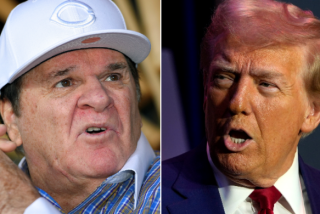Report Accuses Rose of Betting on Reds’ Games
A special investigator’s report to major league baseball on Pete Rose’s alleged gambling, made public Monday by a Cincinnati judge, accuses the Cincinnati Reds’ manager of betting not only on major league games but on his own team’s games as well, from 1985 to 1987.
Lawyers for Rose won a temporary restraining order Sunday, preventing baseball from conducting a hearing with Rose--one was scheduled for today--until at least July 6.
But the Ohio Supreme Court, responding to a suit filed Monday by the Cleveland Plain Dealer, ordered Judge Norbert A. Nadel of Hamilton County Common Pleas Court to release the report or explain why. Nadel, the same judge who Sunday had issued the temporary restraining order, complied reluctantly with the court’s order.
The 225-page report, compiled after a four-month investigation by baseball investigator John M. Dowd, implicates Rose as having gambled extensively on baseball and Reds’ games.
“The testimony and the documentary evidence gathered in the course of the investigation demonstrates that Pete Rose bet on baseball, and, in particular, on games of the Cincinnati Reds baseball club, during the 1985, 1986 and 1987 seasons,” Dowd wrote in the report.
A key element in the report is the transcript of Dowd’s interview with Ron Peters, an Ohio bookmaker with whom Rose allegedly placed baseball bets of up to $2,000 a game.
The exchange:
Dowd: And when he bet baseball, did he bet on the Cincinnati Reds?
Peters: Yes, he did.
Dowd: And this was at a time that he was manager of the Cincinnati Reds?
Peters: Yes, sir.
Dowd: Is there any doubt in your mind?
Peters: Absolutely not.
Peters pleaded guilty recently to charges of tax evasion and conspiracy to distribute cocaine.
Whether Rose bet on Reds’ games is the critical element in the case, since gambling on one’s own baseball team has traditionally carried a lifetime ban from the sport. Eight members of the Chicago White Sox were given lifetime bans in the wake of revelations that gamblers had rigged the 1919 World Series.
Paul Janszen of Cincinnati, who was serving a six-month sentence for tax evasion when the report was compiled but who has since been released, testified that he placed baseball bets for Rose with Peters from April 17, 1987, through May 13, 1987.
The report details specific incidents, described by Janszen, of Rose placing bets with Tommy Gioiosa, a one-time house guest of Rose, on the 1986 National League playoffs between the New York Mets and Houston Astros.
Rose, since the investigation began, has admitted betting on other sports but had denied throughout that he ever bet on baseball games.
The report also shows that during his deposition, Rose was shown gambling sheets, which investigators allege show Rose bet on baseball games, and that expert analysis showed the sheets were in Rose’s handwriting. Rose has denied the writing was his.
Another section describes Gioiosa’s paying Peters $24,000 in Rose’s alleged gambling debts at a cafe in Franklin, Ohio, in 1986. Peters recalled Gioiosa bringing him three $8,000 checks, all payable to cash and signed by Rose.
Peters, according to testimony, told Gioiosa to cash the checks because he did not want his name on them. Gioiosa then cashed the checks and paid Peters in cash.
Dowd wrote in the report that Peters’ recollection of the incident is supported by Rose’s own bank records.
Rose is also accused in the report by Janszen of placing bets in New York and using Michael Bertolini of New York as his runner.
Janszen said that Rose “within a three-month period of time . . . was in debt over $400,000 to the bookie in New York via Mike Bertolini, in baseball betting alone.”
Rose denied ever placing bets with Bertolini.
More to Read
Go beyond the scoreboard
Get the latest on L.A.'s teams in the daily Sports Report newsletter.
You may occasionally receive promotional content from the Los Angeles Times.










